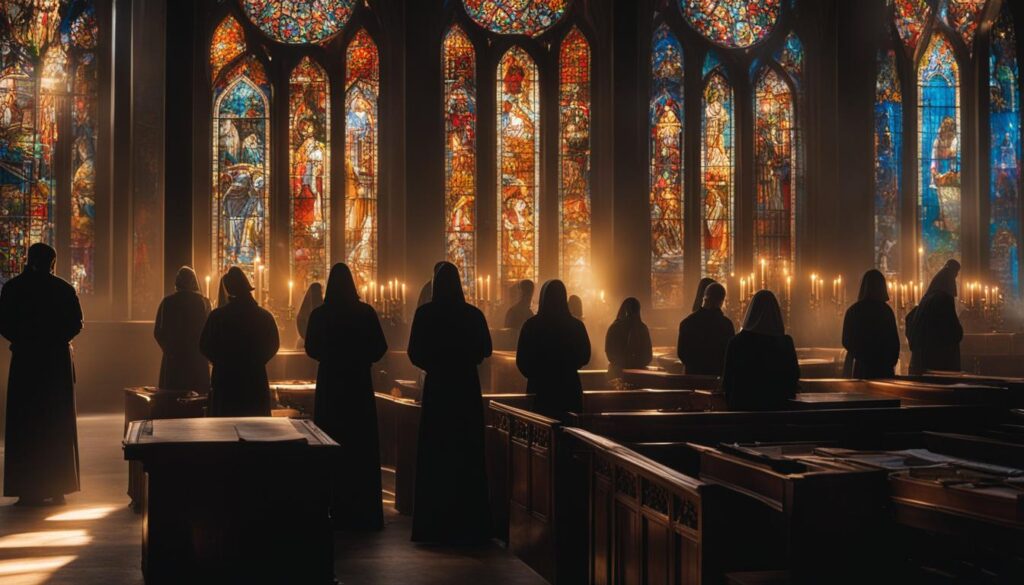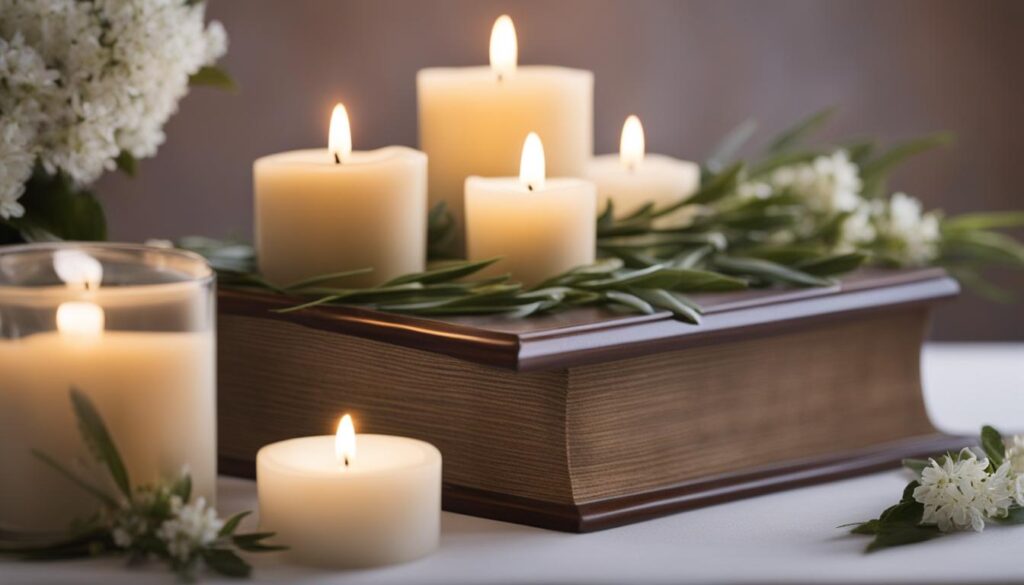The common prayer for a funeral service is a solemn and comforting ritual performed to honor the deceased and offer support and solace to the grieving. It is a time to reflect on the life of the departed and find hope in the promises of eternal life. Funeral prayers are an integral part of this service, as they provide spiritual comfort and serve as a way to remember and commemorate the loved one who has passed away.
Key Takeaways:
- Funeral prayers are a vital part of the funeral service, providing solace and comfort for the bereaved.
- These prayers hold significance for both the deceased and the mourners, offering support and hope.
- Funeral prayers vary based on religious and cultural traditions, reflecting diverse beliefs and customs.
- The structure of funeral prayers typically includes opening greetings, readings, prayers for the deceased, and personal reflections.
- Funeral prayers play a crucial role in providing support, comfort, and healing during the grieving process.
The Significance of Funeral Prayers
Funeral prayers hold deep significance for both the deceased and the bereaved. They provide an opportunity for mourners to express their grief, seek healing, and find solace in the presence of a higher power. These prayers offer a sense of hope, reminding us of the afterlife and the promise of eternal peace. Funeral prayers also serve as a way to honor and pay respect to the departed soul, acknowledging their life and the impact they had on their loved ones.
In times of loss, funeral prayers become a comforting and sacred ritual that connects individuals to their spirituality and faith. They offer a space for reflection, offering solace and strength to those who are mourning. Funeral prayers provide a sense of comfort and support, reminding mourners that they are not alone in their grief. These prayers create a sacred atmosphere that allows individuals to find solace and seek guidance from a higher power. Through the act of prayer, mourners can find healing and peace amidst the pain of loss.
Moreover, funeral prayers also serve as a way to honor and remember the life of the departed loved one. They offer an opportunity for mourners to reflect on the virtues, achievements, and impact of the deceased. Through these prayers, loved ones can celebrate the life and spirit of the person who has passed away, cherishing the memories and ensuring that their legacy lives on. Funeral prayers become a heartfelt remembrance service that honors the memory of the departed and brings comfort to those who are left behind.

As individuals gather to offer funeral prayers, they not only find comfort and support but also experience a profound sense of unity and community. The act of coming together in prayer creates a bond that transcends individual grief. Mourners find strength in the shared experience of loss and the collective hope that comes from seeking solace in a higher power. Funeral prayers become a powerful reminder of the interconnectedness of humanity and the collective journey of navigating grief.
The Power of Funeral Prayers
“In our darkest moments, funeral prayers provide a glimmer of light, a source of hope, and a pathway toward healing. They serve as a powerful tool in the grieving process, offering comfort, strength, and solace. Through these prayers, we honor the departed, remember their life, and find reassurance in the promises of eternity. Funeral prayers hold significant meaning for both the deceased and the bereaved, providing a sacred space for healing, remembrance, and connection.”
Funeral prayers hold transformative power, offering a sense of peace, solace, and hope in the face of loss. They provide comfort to the bereaved and honor the memory of the departed, guiding individuals through the difficult journey of grief. Whether derived from religious or cultural traditions, funeral prayers serve as a beacon of light during dark times, reminding us that even in the midst of sorrow, there is comfort and healing to be found.
Different Types of Funeral Prayers
Funeral prayers can take many different forms, depending on the religious and cultural traditions of the individuals involved. These prayers provide a way to honor the deceased and offer solace to the grieving. Here are some common types of funeral prayers:
1. Christian Funeral Prayers
In Christian funeral services, prayers are often derived from the Bible and the teachings of Jesus Christ. These prayers focus on offering comfort, seeking God’s guidance, and acknowledging the hope of resurrection and eternal life. They may include readings from the Psalms, the Lord’s Prayer, and other passages from the New Testament.
2. Islamic Funeral Prayers
In Islamic funeral services, prayers known as Janazah prayers are recited for the deceased. These prayers invoke Allah’s mercy and forgiveness while offering support and comfort to the bereaved. They are typically performed in a congregation and include specific supplications and recitations from the Quran.
3. Jewish Funeral Prayers
Jewish funeral prayers, known as Kaddish, are recited to honor the deceased and comfort the mourners. The Kaddish is a prayer of praise and affirmation of God’s sovereignty, expressing the hope for peace and redemption. It is often recited by close family members and members of the Jewish community.
4. Hindu Funeral Prayers
In Hindu funeral services, prayers and rituals vary based on regional customs and traditions. These prayers may include recitations from ancient scriptures like the Rigveda or the Bhagavad Gita. The focus is often on seeking blessings for the departed soul, acknowledging the cycle of life and death, and offering support to the grieving family.
These are just a few examples of the different types of funeral prayers that exist across various religious and cultural traditions. Each type of prayer carries its own unique significance and provides a way for mourners to find solace and connect with their faith during times of loss.

The Structure of Funeral Prayers
Funeral prayers follow a specific structure that provides a framework for the service and guides its participants through the grieving process. This structure typically begins with an opening prayer or greeting, acknowledging the presence of a higher power and setting the tone for the service.
After the initial prayer, readings from sacred texts such as the Bible or religious scriptures are shared. These readings offer solace, guidance, and words of comfort to those in attendance. They remind mourners of the promises of eternal life and the presence of a loving and caring God.
Following the readings, prayers for the deceased and the bereaved are offered. These prayers often ask for comfort, forgiveness, and strength during this challenging time. They provide an opportunity for individuals to express their grief, seek healing, and find solace in the support of a community.
The structure of funeral prayers may also include hymns, chants, or other forms of musical expressions. These elements enhance the spiritual atmosphere of the service and provide additional means of comfort and support. The service concludes with a closing prayer or benediction, offering final blessings and words of hope to those in attendance.

The Structure of Funeral Prayers in Summary:
- Opening prayer or greeting
- Readings from sacred texts
- Prayers for the deceased and the bereaved
- Hymns, chants, or musical expressions
- Closing prayer or benediction
By following this structure, funeral prayers provide a comforting and organized framework for honoring the deceased, finding solace in faith, and supporting those who are grieving.
The Role of Personal Remembrances in Funeral Prayers
Personal remembrances play a vital role in funeral prayers, offering a heartfelt and intimate tribute to the life of the departed. These remembrances provide an opportunity for mourners to share their memories, stories, and reflections, celebrating the unique qualities and legacy of their loved one. Through personal remembrances, funeral prayers become a deeply personal and uplifting experience, honoring the individual while bringing comfort and healing to those in mourning.
Personal remembrances can take many forms during funeral prayers. Family members, friends, and loved ones may choose to share anecdotes, funny stories, or moments of profound significance that capture the essence of the departed person. These remembrances serve as a way to commemorate their life, character, and achievements, fostering a sense of connection and love among those present. By sharing personal remembrances, mourners find solace and strength in the memories they hold dear, creating a collective tribute that celebrates the uniqueness and impact of the departed.
“Through personal remembrances, funeral prayers become a deeply personal and uplifting experience, honoring the individual while bringing comfort and healing to those in mourning.”
Personal remembrances also provide a healing space for mourners to express their emotions and find support within the community. As individuals share their memories and stories, they create a supportive environment where others can empathize, relate, and find solace. The act of reminiscing and sharing personal experiences fosters healing and offers a sense of closure, allowing mourners to navigate the grieving process together. Through personal remembrances, funeral prayers become a powerful platform for healing, comfort, and genuine connection.
Incorporating personal remembrances into funeral prayers not only celebrates the life of the departed individual but also serves as a reminder of the importance of cherishing and honoring our loved ones while they are still with us. By sharing stories and memories, we pay tribute to the impact they had on our lives and ensure that their spirit lives on in our hearts. Personal remembrances within funeral prayers bring solace, foster healing, and provide a meaningful way to commemorate and remember the unique and profound presence of our loved ones.

Funeral Prayers as Support and Comfort
Funeral prayers play a significant role in providing support and comfort to the bereaved. They offer a space for mourning, allowing individuals to express their grief and find solace in the community of mourners. These prayers also offer words of comfort, reminding mourners of the love and support of a higher power, and provide them with strength and reassurance during a difficult and emotionally challenging time.
The act of coming together in prayer brings a sense of unity and shared experience, creating a supportive environment where individuals can find solace and understanding. It offers a space for grieving openly and allows people to lean on each other for support. Whether it’s through the spoken word, hymns, or silent reflection, funeral prayers provide a collective experience of healing and comfort.
Furthermore, funeral prayers offer a spiritual connection that transcends the physical realm. They remind mourners that they are not alone in their grief and that there is a higher power watching over them. In times of loss, the knowledge that a loving and caring God is present can bring immense comfort and reassurance. Funeral prayers serve as a reminder of this divine presence and provide a source of strength for the bereaved.

| Ways Funeral Prayers Provide Support and Comfort | Benefits |
|---|---|
| 1. Emotional Support | Funeral prayers offer a supportive environment where mourners can express their emotions openly, fostering healing and emotional well-being. |
| 2. Spiritual Guidance | Prayers provide a sense of spiritual connection and guidance, reminding mourners of the presence and love of a higher power. |
| 3. Sense of Community | Coming together in prayer creates a sense of unity and shared experience, allowing individuals to lean on each other for support and find solace in the community of mourners. |
| 4. Reassurance and Strength | Funeral prayers offer reassurance and strength during times of loss, reminding the bereaved that they are not alone and providing them with the strength to navigate their grief. |
“Funeral prayers offer a sacred space for grieving, allowing individuals to find solace in their faith and a higher power. These prayers serve as a beacon of hope, guiding individuals through the journey of grief and offering reassurance in the face of loss.”
Cultural and Religious Variations in Funeral Prayers
Funeral prayers encompass a wide range of cultural and religious variations, reflecting the diverse ways in which different communities approach death and the afterlife. These variations not only demonstrate the rich tapestry of human beliefs and customs but also provide comfort and solace to the bereaved during their time of grief.
Cultural Variations
Funeral prayers can differ significantly based on cultural traditions. In some cultures, such as those in East Asia, funeral ceremonies may involve rituals and practices rooted in ancient traditions. For example, in Japan, a Buddhist funeral commonly includes chanting, offering incense, and reciting sutras to guide the soul of the deceased towards enlightenment. Similarly, in Hindu funeral ceremonies in India, the grieving may engage in rituals that involve cremation, ornate ceremonies, and prayers with sacred mantras.
While cultural variations exist, funeral prayers often share a common purpose: to honor the memory of the departed and provide solace to the bereaved. These prayers serve as a cultural bridge, connecting individuals to their heritage and offering a sense of identity and belonging during a time of loss.
Religious Variations
Religious traditions also play a significant role in shaping funeral prayers. Different faiths have distinct rituals, prayers, and beliefs surrounding death and the afterlife. For example, Christian funeral services often involve prayers that focus on seeking comfort, expressing hope in resurrection, and finding solace in the promises of eternal life. In contrast, Islamic funeral prayers, known as Janazah prayers, are performed in congregation and involve specific supplications and recitations from the Quran, seeking mercy and forgiveness for the deceased.
Judaism, with its rich heritage, has its own set of mourning practices and prayers. The Jewish funeral service, known as a Levayah, includes the recitation of psalms, the Kaddish prayer, and eulogies that pay tribute to the deceased. These religious variations provide a framework for mourners to express their grief, seek spiritual support, and find comfort in their faith traditions.
| Cultural Variations in Funeral Prayers | Religious Variations in Funeral Prayers |
|---|---|
| East Asian customs, such as Buddhist funeral rituals | Christian prayers emphasizing hope and resurrection |
| Indian Hindu funeral ceremonies with sacred mantras | Islamic Janazah prayers seeking mercy and forgiveness |
| African tribal traditions honoring ancestral spirits | Jewish Levayah service with recitation of psalms and the Kaddish prayer |
These cultural and religious variations in funeral prayers highlight the profound impact of traditions, customs, and beliefs on the grieving process. They offer a sense of continuity, connection, and reverence for the deceased, providing a pathway to healing and acceptance during a time of loss.
The Power of Prayer for Grief and Healing
Grief is a deeply personal and challenging journey that we all experience at some point in our lives. While the pain of loss can be overwhelming, prayer has long been recognized as a powerful tool for finding solace and healing in times of grief. The act of prayer allows us to connect with our spirituality, offering comfort and support as we navigate the emotional turmoil associated with loss.
Prayer has the remarkable ability to provide a sense of peace and clarity during difficult times. It allows us to express our deepest emotions and find strength in our faith. Whether through words spoken aloud or in the quiet recesses of our hearts, prayer serves as a channel for catharsis, releasing the weight of sorrow and allowing us to find a renewed sense of hope.
“Prayer is not asking. It is a longing of the soul. It is a daily admission of one’s weakness. It is better in prayer to have a heart without words than words without a heart.” – Mahatma Gandhi
Healing takes time, and prayer provides a way to navigate the healing process. It offers a space for reflection, self-care, and seeking guidance from a higher power. Through prayer, we can find the strength to forgive, both ourselves and others, and to embrace the memories of our loved ones with love and gratitude. The power of prayer lies not only in its ability to heal our hearts but also in its capacity to reaffirm our connection to something greater than ourselves, reminding us that we are never alone in our grief.
| Prayer for Grief and Healing | Key Benefits |
|---|---|
| Guidance and Clarity | Prayer can help us find guidance and clarity during times of grief, allowing us to make sense of our emotions and find a path forward. |
| Emotional Release | Prayer provides a safe and sacred space to express our deepest emotions, offering a release valve for the pain we carry in our hearts. |
| Strength and Resilience | Through prayer, we can find the strength and resilience to face the challenges of grief, knowing that we are supported by a higher power. |
| Connection and Community | Prayer connects us to a community of faith and like-minded individuals who can offer support, empathy, and understanding during our healing journey. |
Honoring the Memory of Loved Ones through Funeral Prayers
Funeral prayers offer a profound way to honor the memory of loved ones who have passed away. These prayers provide a space for reflection, remembrance, and heartfelt tribute to the life and legacy of the departed soul. By coming together in prayer, mourners can find solace, support, and a sense of connection as they navigate the grieving process.
During funeral prayers, individuals have the opportunity to share personal stories, anecdotes, and memories that celebrate the unique qualities and impact of the loved one. These heartfelt remembrances not only pay homage to the life of the deceased but also provide comfort and healing to those left behind. The act of honoring their memory through prayer creates a sacred space where the love, laughter, and cherished moments shared with the departed can be preserved and cherished.
Furthermore, funeral prayers serve as a powerful reminder that the memory of loved ones lives on. As friends and family gather to offer their prayers, they create a collective bond that transcends time and space, ensuring that the legacy of the departed continues to shape and inspire generations to come. Through these prayers, the memory of loved ones becomes a source of strength, comfort, and inspiration for the bereaved, offering a guiding light during their journey of healing and remembrance.
In summary, funeral prayers are a deeply meaningful way to honor the memory of loved ones, allowing mourners to come together, share stories, and seek solace in their faith. These prayers provide a space of remembrance, healing, and connection, ensuring that the legacy of the departed lives on in the hearts and minds of those who mourn them.
The Comfort and Hope Found in Funeral Prayers
Funeral prayers offer solace, comfort, and hope to those who have lost a loved one. In the midst of grief, these prayers provide a sacred space for individuals to find strength in their faith and seek comfort from a higher power. They serve as a beacon of hope, guiding mourners through the challenging journey of loss and reminding them of the promise of eternal life.
During a funeral service, the power of prayer becomes evident as it brings a sense of peace and tranquility to the grieving heart. It allows individuals to connect with their spirituality and find solace in the belief that their loved one has found eternal rest. Prayer offers a source of comfort, providing reassurance that even in the midst of sorrow, there is hope for healing and renewal.
“May the Lord bless you and keep you; the Lord make his face shine on you and be gracious to you; the Lord turn his face toward you and give you peace.” – Numbers 6:24-26
Funeral prayers also foster a sense of community and support as mourners gather to honor and remember the life of the departed. They offer a space for individuals to come together, share their grief, and find strength in the collective presence of others who are experiencing similar emotions. In these moments of prayer, mourners can draw comfort and support from one another, knowing that they are not alone in their journey of grief.
While the pain of loss may be overwhelming, funeral prayers provide a glimmer of hope. They remind mourners that love endures beyond death and that the memories and legacies of their loved ones will continue to live on in their hearts. Through the power of prayer, individuals find solace, healing, and the courage to embrace life once again.
Conclusion
Funeral prayers hold a significant place in the grieving process, offering comfort, healing, and hope to those who have lost a loved one. These prayers, derived from diverse religious and cultural traditions, serve as a bridge between the earthly realm and the spiritual realm, providing solace in the face of loss and reminding mourners of the promise of eternal life.
Funeral prayers have a comforting power that brings peace to the hearts of the bereaved. They offer a sacred space for mourning, allowing individuals to find solace in their faith and a higher power. These heartfelt remembrance services create an atmosphere of unity, where mourners can come together to honor the memory of their departed loved one.
Whether through Christian, Islamic, Jewish, Hindu, or other religious traditions, funeral prayers offer a sense of connection to something greater than ourselves. They provide strength, support, and connection as individuals navigate the emotions and challenges of grief. By embracing the power of funeral prayers, mourners find comfort and hope in the midst of their sorrow.
FAQ
What is the common prayer for funeral service?
The common prayer for a funeral service is a solemn and comforting ritual performed to honor the deceased and offer support and solace to the grieving.
What is the significance of funeral prayers?
Funeral prayers hold deep significance for both the deceased and the bereaved. They provide an opportunity for mourners to express their grief, seek healing, and find solace in the presence of a higher power.
What are the different types of funeral prayers?
Funeral prayers can vary based on religious and cultural traditions. In Christian funeral services, prayers are often derived from the Bible and the Christian faith. Other religious traditions have their own specific prayers and rituals for funeral services.
What is the structure of funeral prayers?
The structure of funeral prayers typically follows a specific format. It usually begins with a greeting or opening prayer, followed by readings from sacred texts, prayers for the deceased and the bereaved, and may include hymns or other musical expressions.
What role do personal remembrances play in funeral prayers?
Personal remembrances offer an opportunity to reflect on the life and impact of the departed. They can include sharing stories and memories that honor the person’s character, achievements, and impact on others.
How do funeral prayers provide support and comfort?
Funeral prayers offer a space for mourning, allowing individuals to express their grief and find solace in the community of mourners. They also provide words of comfort, reminding mourners of the love and support of a higher power.
How do cultural and religious variations impact funeral prayers?
Funeral prayers can vary greatly based on cultural and religious traditions. Each culture and religion may have specific rituals, chants, or customs unique to their community.
What is the power of prayer for grief and healing?
Prayer has long been recognized as a powerful tool for grief and healing. It allows individuals to connect with their spirituality, find solace in a higher power, and seek comfort during times of loss.
How do funeral prayers honor the memory of loved ones?
Funeral prayers provide an opportunity to remember and commemorate the loved one who has passed away. They offer a space to hold onto cherished memories and ensure that the legacy of the loved one lives on.
What comfort and hope do funeral prayers provide?
Funeral prayers offer a sacred space for grieving, reminding mourners of the promises of eternal life, the presence of a loving and caring God, and the support of a community that stands together during times of loss.









